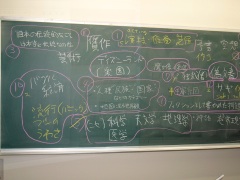
歴史学メジャー History Major


「歴史学研究方法」フィールド・トリップ(不定期開催)。江戸の史跡や資料館を歩きました。
歴史学を専攻しよう
ICUの歴史学は、履修計画の自由度が高いメジャーです。歴史専攻生は全員「歴史学研究方法」を履修しなければなりませんが、これも2年生から4年生までのどの時点で履修してもかまいません。その他には、基礎科目でもある100番台のコースを地域を変えて少なくとも2コース6単位を履修していること、また3〜4年次には自分の選んだ卒業研究アドヴァイザーにあわせて300番台の「文献・史料購読」を1コース3単位履修することが求められます。逆に言えば、以上の条件を満たせば他にどのコースをどんな順番で履修してもよいということです(下のチャートを見てください)。これは歴史学が本来とてもリベラルアーツ的なディシプリンであるためです。歴史学の課目以外でも、自分の問題関心に応じて履修したどのコースも、すべて知的栄養にできると考えます。そのかわり3年後半からの卒業研究は、自分の漠たる問題関心をアカデミックな議論に高められるように、1年間かけてみっちりと指導します。覚悟しておいてください。
The History major at ICU allows great freedom in your academic planning. All students majoring in History must take the course ‘Methods for Historical Research’, but you may take this course during the Spring term of your second, third, or fourth year. In addition to this course, you will take at least two Foundation courses at the 100 level (which equals at least 6 units) to cover two or more geographical regions. Further, you will take ‘Readings’, the 300-level course taught by your Senior Thesis advisor. Stated differently, as you fulfill the requirements above, you may take other History courses in any order you wish (Please see the table below). The History major has this freedom because it has always been a central academic discipline of liberal arts. We think that classes in other ICU departments that relate to your own academic interests, too, will provide you with intellectual nourishment. In turn, for your Senior Thesis research, which will begin in the second half of your third year, we will provide serious guidance for one year in raising your vague topic of interest into an academic argument. Please be ready!
「歴史学研究方法」では、地域・時代を超えてひとつのテーマについて教員・学生がともに議論し、グループ研究プロジェクトを行います。写真はクラス全体で行ったブレイン・ストーミングのあと。この年のテーマは「歴史のなかのフィクション」でした。
過去を学ぶことは現在を理解するため、
そして未来を語るために不可欠な営みです。